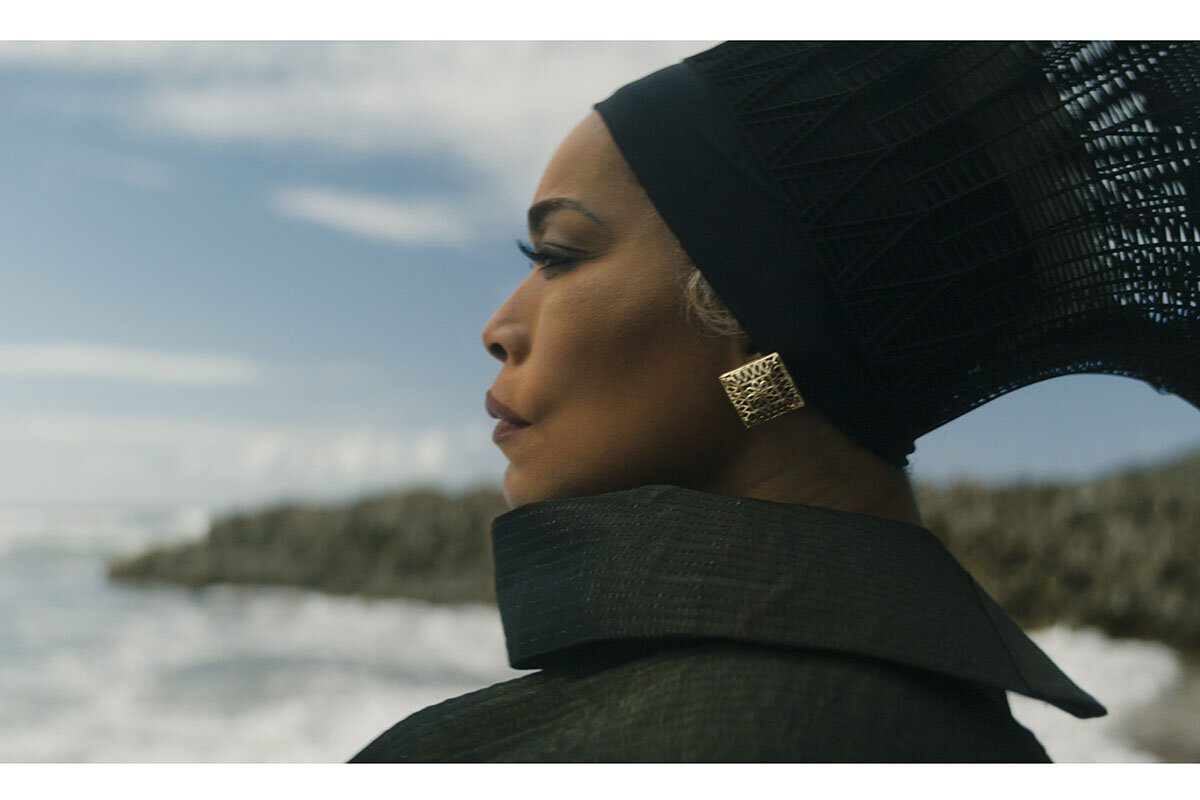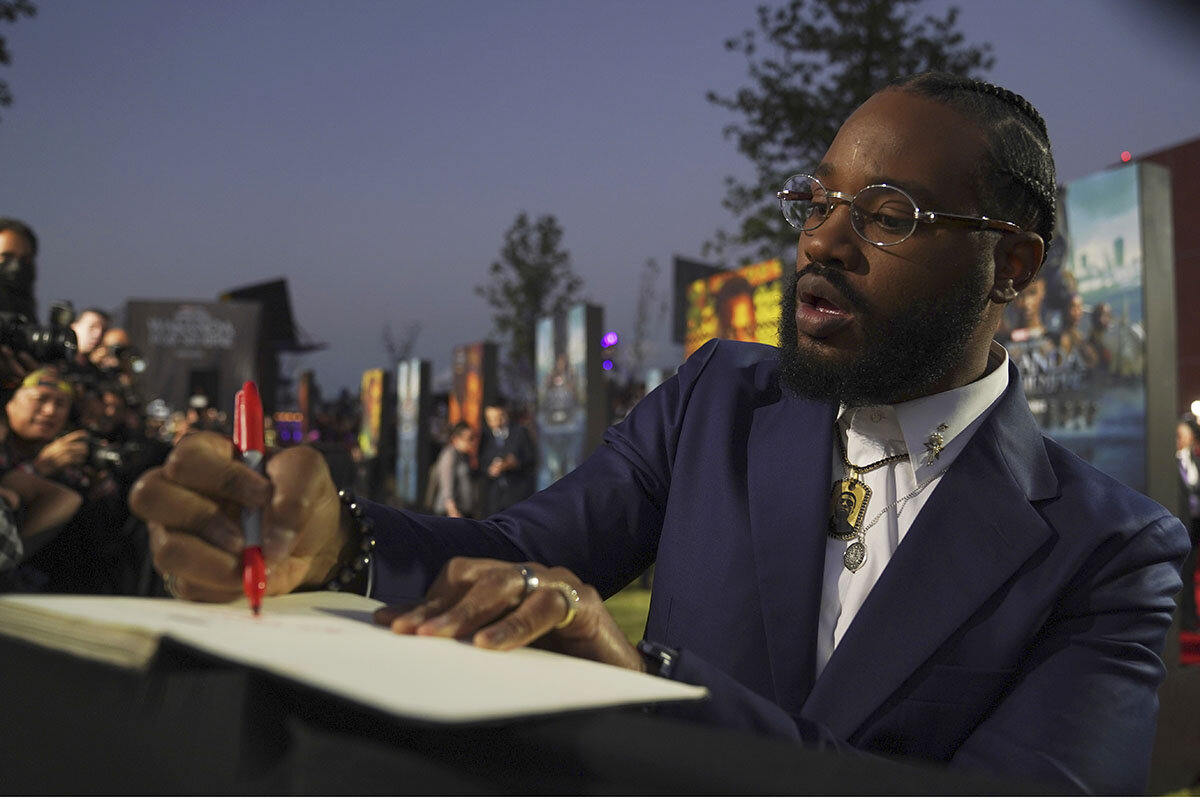‘Wakanda Forever’: A hero is gone, but his legacy lives on
Loading...
I crossed paths with Chadwick Boseman only once in this lifetime – during the red carpet premiere of the James Brown biopic “Get On Up” in Augusta, Georgia, in 2014.
He had only recently gotten into the business of playing Black icons. A year prior to his performance as the Godfather of Soul, he took on the role of Jackie Robinson in “42.”
The only thing that might have given away Mr. Boseman’s sense of royalty, other than the fact that the event was at Regal Cinemas, was a sharp hairline and a checkered suit that either looked purple or blue depending on the beholder – a preview of the vibranium-infused threads he would soon wear as King T’Challa in Marvel’s “Black Panther.”
Why We Wrote This
A story focused onThe “Black Panther” sequel presents the opportunity to mourn the death of a beloved actor, but also to consider his powerful legacy of perseverance.
Everyone who was close to Mr. Boseman – the people who profoundly loved him – called him Chad, a modest name that described his workman’s approach to his craft and belied his star-studded talent.
“Black Panther: Wakanda Forever,” the just released sequel, is a love letter to Chad, who died in 2020, both in how it honors him and how, in the true essence of the business, the show must go on. But how does the show go on without its source material? And what happens when that source material is a person?
Comic book fans obsess over the details of narratives in what we commonly describe as “canon,” the literal gospel of a hero’s origin, abilities, and fate. His life and death broke through such meddling restrictions, and it is sadly ironic that he became the Black Panther in the same year that he was diagnosed with colon cancer, 2016. It is in how Mr. Boseman persevered, despite illness, that we see the true nature of being a superhero, that what one might perceive as weakness, he would embrace with strength and dignity.
He became the backbone of the “Black Panther” franchise in a way that transcends flesh and bone. His performance affects how we view the character, the same way Adam West’s did with Batman in the 1960s and Jack Nicholson’s did with his 1980s Joker. While I empathize with calls to recast the Panther, they also seem insensitive to me. None of us, not “Black Panther” director Ryan Coogler, nor co-stars such as Letitia Wright, nor fans, had a chance to mourn Chad on the silver screen. We needed that catharsis, the same way we need to profoundly mourn the lives lost around the world since we lost our Black Panther.
Mr. Coogler understood this, which is why in a movie about a comic book, wrapped in a movie about colonialism, with the perspective of community, he chose camaraderie. He was Chad’s friend first and his message of care resonated with viewers, as evidenced by a $330 million global weekend at the box office, including some $180 million in North America.
It’s why the scene in “Wakanda Forever” that memorializes T’Chad – I mean, T’Challa – resonates so deeply. It’s not just the pageantry of the mourners in white, nor is it the backdrop of royal Wakandan architecture. It’s the humility of the clay structures, draped with a mural of the once and future king. It’s a beautiful simplicity that matches the legacy of our protagonist. That scene could have played out in Wakanda just as easily as it could have played out in his native Anderson, South Carolina.
“Wakanda Forever,” in turn, is about how we deal with trauma, not just in the world around us, but within our own homes and spaces. Angela Bassett’s depiction of Queen Ramonda – defiant diplomat, mourning mother, and courageous commander – deserves some Oscar buzz.
She, Mr. Coogler, and an assortment of characters, both new and old, take the adage of “turning lemons into lemonade” and turn lament into legacy.
I only crossed paths with Chad once, but as a native South Carolinian, I am proud to call him a brother. I will miss him because of commonalities, such as summers spent in small towns like Anderson and Belton, South Carolina, with their dirt roads and country quirks. I distinctly remember the ambience of being surrounded by lightning bugs and how powerful it made me feel.
Personally, I will miss him because of shared communities – my mom used to attend church with his parents. And I will miss Chad because he saw a life beyond South Carolina’s manufacturing industry. He crafted interpretations of factual and fictional characters that endeared him to the world – forever.
Ken Makin is the host of the “Makin’ a Difference” podcast. “Black Panther: Wakanda Forever” is rated PG-13 for sequences of strong violence, action, and some language.








